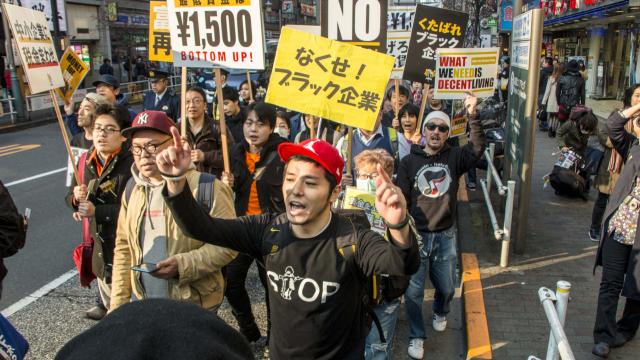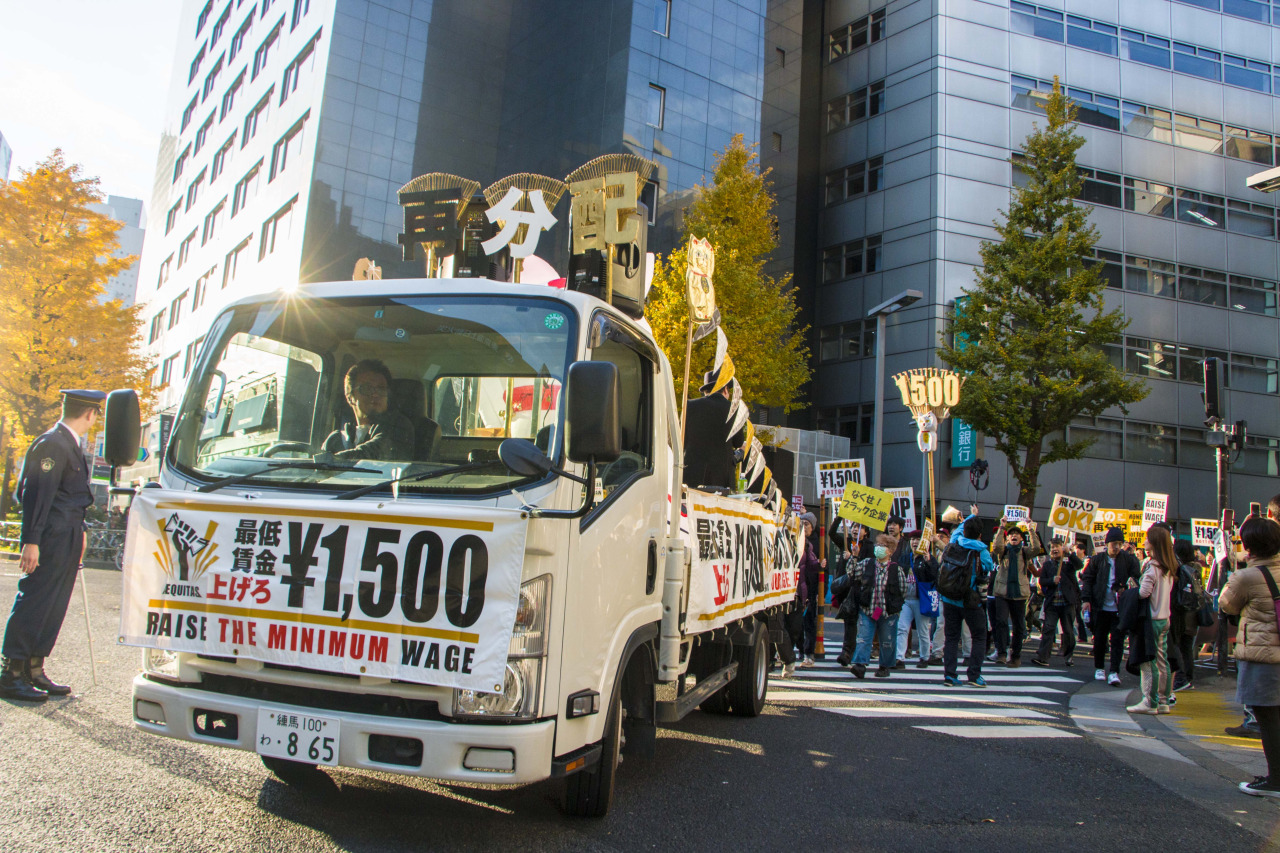
On a recent Sunday afternoon, some 400 protesters — comprised of workers, students and retirees — poured into the streets of Tokyo’s bustling commercial center. At the front of the line were members of AEQUITAS, a group of young labor activists who have taken on Japan’s Fight for $15 living wage movement.
“We don’t need poverty wages,” they shouted, as shoppers and tourists took out their phones to capture the rare spectacle. “If you’re struggling, raise your voice.”
In Japan, where demonstrations are still few and far between, gathering a crowd can be tricky. When Fight for $15 organizers in the United States called for a global day of action last May, about 50 protesters showed up to the rally in Tokyo, most of them union organizers. Since its formation in September 2015, however, AEQUITAS — which means “justice” in Latin — has staged several demonstrations that have amassed hundreds of protesters calling for a nationwide minimum wage of 1,500 yen, which amounts to roughly $15.
“We saw the movement in the United States and thought we could do it here, too,” said Harada Niki, a 27-year-old labor activist and one of the group’s founding members. “We knew the movement could be global.”
Like so many of Japan’s new generation of activists, Harada became an organizer during the anti-nuclear protests in the wake of the 2011 Fukushima disaster, which has become a kind of Occupy moment in Japan. “The anti-nuclear protests radically changed the way we organize,” he said. “It created a network of people who wanted to work for social justice.”
But for Harada, the nuclear disaster also laid bare the country’s class tensions, pushing him toward labor organizing and union activity. “The government imposes nuclear power plants on poor, rural communities,” Harada said. “I realized that labor lies at the core of all our struggles. If we don’t fix the structural problem that underlies all these issues, we can’t move forward.”
After meeting with organizers taking part in the living wage movement in the United States, Harada banded together with friends — many of whom he met during the anti-nuclear protests — to launch AEQUITAS as an organization committed to democratizing the country’s gargantuan economy.
Since the 1950s, Japan’s labor movement has been in perpetual decline. The participation rate of Japanese workers in labor unions has continued to diminish, down from 55.8 percent in 1949 to a mere 17.4 percent today. Given the fact that 90 percent of unions in Japan are enterprise unions limited to long-term, salaried employees, the rising proportion of contract workers and part-time employees has left more and more workers out of the equation. AEQUITAS seeks to change all that.
Saito Michiaki, a 22-year-old college student who joined the group last year, says many people who come out to the meetings and demonstrations are often unfamiliar with labor activism. “When labor unions put up flags at their events, they tend to scare away people who don’t really know what they’re about.” Although some of the group’s 30 core members participate in union organizing, the group has made a point to work independently of labor unions in an effort to remain a movement of ordinary workers, relying on donations and social media to garner support. “Our goal is to galvanize people who have never really thought of themselves as workers,” Saito explained.
Rather than protesting outside government buildings or financial districts, AEQUITAS almost always hosts its demonstrations in bustling commercial districts where many low-wage workers toil. “When we protest in these spaces,” Saito said, “we show people that it’s OK to speak up and say you’re suffering.” More than anything, the protests provide grounds for building communities of struggle in a society bent on silencing workers.
Fujikawa Rie, a 24-year-old activist who joined AEQUITAS last December, says the hostility and stigma against low-wage workers often keep people from speaking up about their experiences. In August, Katayama Satsuki, a politician of the ruling Liberal Democratic Party, or LDP, posted a tweet bashing a high school student for “exaggerating” her experience of poverty in an interview on national television. “If you can’t afford to go to college,” Satsuki said. “Support yourself with scholarships and loans!” Her comments were followed by hundreds of similar tweets attacking the high school senior, including memes mocking her “poor looks.”
“As an activist, I get told that I should be working instead of protesting,” said Fujikawa, who often shares her own experience with poverty at events. “I mean, this country bashes children for simply being poor.”
Since the 1990s, the number of non-permanent contract workers has seen a steady increase, while — at the same time — poverty rates have reached an all-time high. Japan has some of the highest levels of child poverty among the wealthiest nations in the world, according to a UNICEF report released this year. Despite their relative financial stability compared to contract workers, many permanent employees also fall victim to debilitating working conditions. Recently, the suicide death of a young woman at an advertising firm sparked controversy when it was revealed that her overtime hours exceeded 100 hours per month. “The system pits workers against workers,” Fujikawa said. “We’re pushed to turn on each other because so many of us are struggling.”
According to Takasu Hirohiko, the project director of Fair Labor Center, Hitotsubashi University in Tokyo, the deepening divide between permanent employees and contract workers has fueled the bashing of welfare recipients, who constitute 1.7 percent of the population. “For permanent employees and workers just above the welfare cut-off, they feel that the system is built to only support low-wage workers,” Takasu explained. “Instead of demanding an expansion of labor rights and a social safety net, people turn on those at the bottom — and, like in the United States, the government capitalizes on this sentiment to cut welfare spending.”
In July, a former employee went on a killing spree at a facility for people with disabilities in Sagamihara, a suburb of Tokyo, stabbing 19 people to death and injuring many more. The man justified his killings by calling people with disabilities “useless” and a “waste of taxpayers’ money.” While government officials and media outlets have dismissed the perpetrator as mentally ill, disability rights activists say the mass murder was not an isolated event. “For years, government officials have spread harmful rhetoric against welfare recipients and those of us who cannot work,” disability rights activist Onoe Yusuke said at an anti-poverty rally in October. “They have created a society in which people are disposed of.”
For AEQUITAS, raising the minimum wage is not the end goal, but rather a crucial step in building resistance against forces that seek to exploit and divide people. As if to capitalize on the growing economic anxiety, the “Neto-uyo,” or “internet right-wing,” — Japan’s equivalent of the alt-right in the United States — has taken to bashing immigrant workers, who often bear the brunt of poor working conditions. “The number of foreigners in Japan who receive welfare is three times that of Japanese workers,” one post reads. “Our hard-earned money is wasted on Chinese and Korean garbage.” (In reality, 97 percent of welfare recipients are Japanese nationals.)
Under Prime Minister Shinzo Abe, a fierce proponent of neoliberal policies at home and abroad, it is likely that economic instability for workers will only continue to grow. But that won’t deter Japan’s living wage movement, which has already achieved several milestones. Since AEQUITAS began calling for a 1,500 yen minimum wage, a number of opposition politicians and unions have joined them in their fight — including some who initially only called for a minimum of 1,000 yen.
Just as low-wage workers across the United States changed the course of politics through asserting their space in American society, Japan’s Fight for $15 is also a fight for visibility. “I think many people in this country see their struggle in isolation,” Fujikawa said. “We’re out in the streets to show we’re here and we’re angry.”
Originally published on Waging Nonviolence
3 WAYS TO SHOW YOUR SUPPORT
- Log in to post comments












